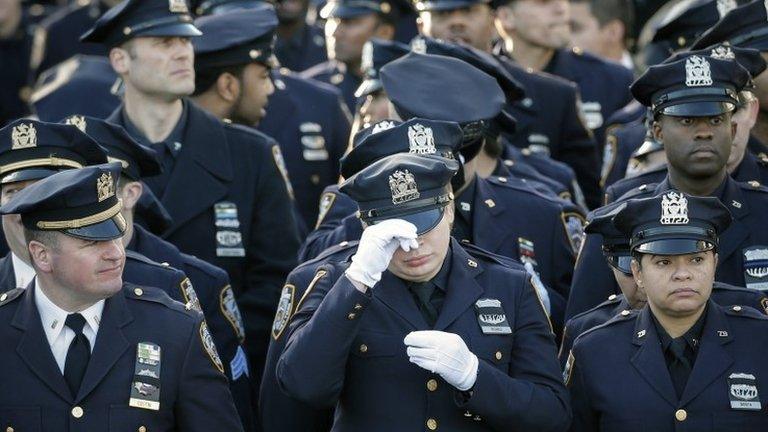Is New York police's 'virtual work stoppage' a boon for critics?
- Published
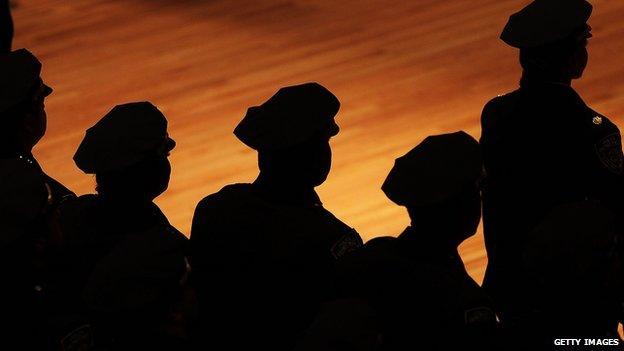
What if a major US city's police department drastically reduced the number of arrests it made and fines and citations it issued, and no one noticed?
Such seems to have been the case in New York City last month, as police officers apparently began a deliberate work slowdown - labelled a "virtual work stoppage" by the New York Post, which first reported, external the numbers (independently confirmed by the BBC).
For the week of 22 December, citywide traffic tickets dropped 94% from the same period in 2013. Court summons for low-level offences, like public intoxication, also dropped 94%. Parking tickets were down 92%. Overall arrests were down 66%, as well.
The proximate cause of the slowdown, according to the Post, was the murder of two New York police officers - Rafael Ramos and Wenjian Liu - by a gunman who had taken to social media earlier in the day to cite police abuses in New York and Ferguson, Missouri, as his motivation.
Other police concerns appear to be at play, including the the department's rocky relationship with New York Mayor Bill de Blasio.
"Police sources said Monday that safety concerns were the main reason for the drop-off in police activity, but added that some cops were mounting an undeclared slowdown in protest of de Blasio's response to the non-indictment in the police chokehold death of Eric Garner," the Post reporters write.
The New York Daily News found that the two police precincts where the murdered officers worked issued only one ticket or criminal summons in the seven days following the attack, down from 626 made during the previous week.
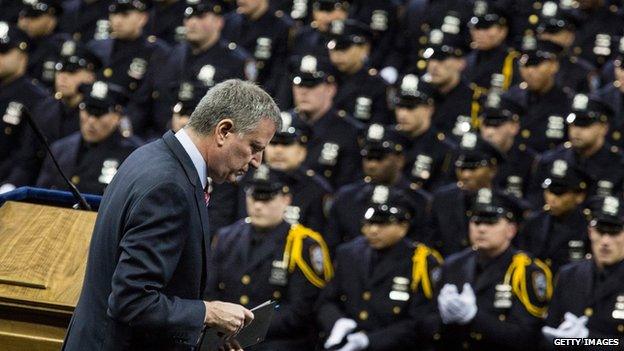
New York Mayor Bill de Blasio is said to be facing an "open rebellion" in his city's police force
The massive drop in law enforcement has prompted a mix of concern and - perhaps surprisingly - hope among some police critics. The hope is revealed as some commentators wonder whether the public at large will start viewing the previously high levels of police activity as unnecessary for keeping the city safe.
They've used the opportunity to push back against the "broken windows theory, external" of law enforcement, in which low-level crimes are vigorously prosecuted as a way to prevent the occurrence of more major infractions. The principle has been a staple of New York City policing since Rudy Giuliani became mayor in 1994, but has been criticised, external as leading to a disproportional punishment of minorities.
Several writers point to a particular line in the Post piece - that police are now "turning a blind eye to some minor crimes and making arrests only 'when they have to'" - as prime evidence of ongoing police overzealousness.
"Well, we can only hope the NYPD unions and de Blasio settle their differences soon so that the police can go back to arresting people for reasons other than 'when they have to'," Scott Shackford of the libertarian Reason magazine wryly notes, external.
One of those "other" reasons numerous critics on the left and right point to is the financial boon for city coffers that comes from fines and court fees generated by law enforcement.
The police slowdown "shines a light on the use of police officers to make up for tax shortfalls using ticket and citation revenue", writes, external Rolling Stone's Matt Taibbi.
"It's wrong to put law enforcement in the position of having to make up for budget shortfalls with parking tickets, and it's even more wrong to ask its officers to soak already cash-strapped residents of hot spot neighbourhoods with mountains of summonses as part of a some stats-based crime-reduction strategy," he continues.
What if these latest developments show that the New York police can "safely cut arrests by two-thirds", asks, external the Atlantic's Matt Ford. The implications are immense, he says. Fewer people could be arrested and sent to prisons that often have brutal conditions.
"A brush with the American criminal-justice system can be toxic for someone's socioeconomic and physical health," he says.
The New York Daily News's Harry Siegel writes, external that while New York police have "real reasons to be upset" about Mr de Blasio's efforts to expose law enforcement officers to greater criminal prosecution, they shouldn't have launched this "unprecedented, deeply disturbing, police rebellion".
He compares the slowdown to attempted extortion. "Nice city you got here," he writes. "Be a shame if something happened to it."
But with crime in the city dropping in 2014, and the streets apparently calm even during the latest police (in)action, the move could backfire.
"It's tough to run a protection racket when people don't feel threatened, and New York ended 2014 with new lows in murders, rapes, burglaries, grand larcenies and robberies," he writes. "For over 20 years, crime has dropped as the NYPD has doubled and redoubled its enforcement efforts. At some point, the chemo is deadlier than the cancer."
The Federalist's Ben Domenech goes even farther, calling, external the police move a threat to democracy more reminiscent of a Latin American coup d'etat.
"The NYPD needed to be reminded that chain of command exists, and that they are not at the top of it," he writes. "Instead, what New York City is experiencing now amounts to nothing less than open rebellion by the lone armed force under the worst kind of weakened junta, one led by a figure ideologically radical and personally weak, who has lost control of his bureaucracies and may soon be devoured by them."
There are clearly storm clouds looming over New York City. But will the end result be newly discovered silver linings or an impending deluge?
- Published22 December 2014
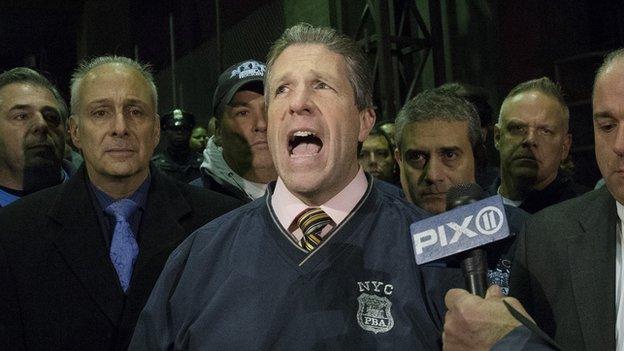
- Published4 December 2014
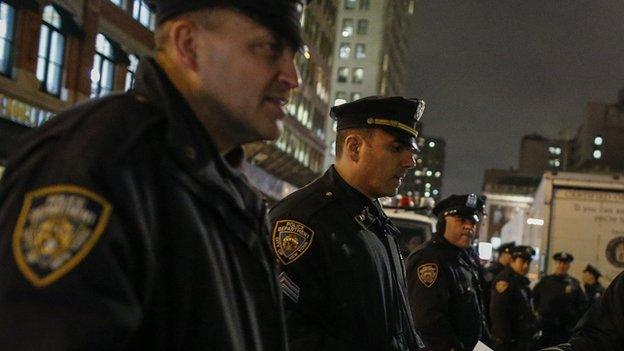
- Published27 December 2014
